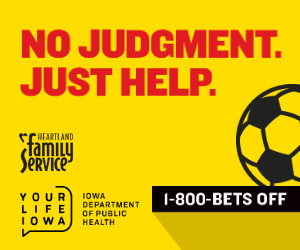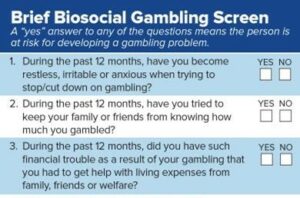Problem Gambling Treatment
Our Heartland Family Service Problem Gambling Treatment services are to improve the quality of life for gamblers and to help them grow and live in recovery. Education of clients includes learning about the process of addiction, relapse prevention, and medical/psychological aspects of addiction. The outpatient structure enables the problem gambler to continue to meet job, school, and family obligations while managing his or her financial situation. Services include individual and group therapy and financial counseling.
Counseling, education, and support services are also available to family members or concerned others. The Problem Gambling Treatment services also provide prevention information and education to the community.
Areas Served
Iowa: Harrison, Mills, & Pottawattamie Counties
Nebraska: Cass, Dodge, Douglas, Sarpy, & Washington Counties
Eligibility & Fees
Must live in one of the counties listed in areas served.
Fees: Iowa: Co-pays Nebraska: Sliding scale, co-pays
Call: 24/7 Problem Gambling Crisis Line | (800) Bets-Off
Text: (855) 895-8398
YourLifeIowa.org
To contact our Problem Gambling Treatment service, call (402) 552-7400.
Funding: The Heartland Family Service Problem Gambling Treatment service is part of the Iowa Department of Public Health (IDPH) Integrated Provider Network, with services funded by the IDPH and the U.S. Dept. of Health and Human Services Substance Abuse and Mental Health Services Administration.
Warning Signs of Problem Gambling
It is important to understand the warning signs of a gambling problem. A simple screening tool can indicate whether a person needs to see further evaluation.
Examples of signs that gambling is no longer safe.
- Bets more money or more often to get the same excitement.
- Restless or irritable when trying to cut down or stop playing.
- Attempts to stop or cut back on gambling.
- Preoccupied (daydreaming) about when and how they can gamble next.
- Decides to gamble when sad, lonely, anxious, angry, etc.
- Returns another day to get even (chasing one’s losses).
- Lies about their gambling
- Impacts a person’s relationships, job, hobbies, finances, etc.
- Asks others for help to cover gambling debts.
- Steals to cover gambling debts.
Have the Conversation About Problem Gambling
Do you know someone with a gambling problem? Have the conversation. Around 26,000 people in the Metro area meet criteria for gambling addiction, and many more are affected by an individual’s gambling problem, yet only a fraction seek help. We believe many who suffer in silence do so because they don’t know they developed a problem, what gambling addiction is, or where to get help.
Problem Gambling is a public health issue affecting all aspects of physical, social, and mental health. It can affect families, work performance and general well-being. It is important to know the signs of a gambling problem that treatment is available, and that it works.
How Does Problem Gambling Impact Me?
• It is estimated that 1 out of 5 people are affected by one individual’s gambling problem.
• If you gamble it is important to recognize that what was once fun and recreation can become a serious issue.
• Your awareness may help a loved one seek the necessary help.
• Problem gambling is a public health issue that impacts relationships, families, businesses and communities.
What Are the Consequences of a Gambling Addiction?
• If untreated, gambling addiction can lead to serious health issues including suicide, depression, domestic violence, and work issues.
• Children of a person with a gambling problem show higher rates of gambling problems and higher levels of tobacco, alcohol, drug use and overeating than children of people without gambling problems.
• It can cause stress in relationships and families.
• It can cause financial devastation.
• It can result in depression and other mental health concerns.
How Do I Have the Conversation with a Loved One?
Talking with someone you know about a potential gambling problem can be difficult. Remember, you can’t stop the person from playing; only he or she can make the decision to stop. Choose the right moment, Speak in a caring and understanding tone and hear what he or she is saying. To start the conversation:
• Be clear, non-judgmental and speak only for yourself.
“I’ve been noticing changes in your behavior, and I’m worried about you.”
• Be positive.
“Your involvement in our family is usually so good and we miss you.”
• Explain how the problem affects you.
“The amount of money you are spending on gambling is hurting our family. • Use everyday observations. o You are coming home late everyday and too distracted to spend time with us.”
• Be clear about your position.
“We all depend on each other; we need to be able to count on you.”
• Be prepared for denial or hostile reaction.
“It must be uncomfortable to hear this. It’s difficult for me to bring it up, but I am concerned about you.”
Don’t try to fix the problem yourself.
Help is available for the concerned other as well as the individual with the gambling problem,
call the toll-free Bets Off helpline at 1-888-BETSOFF.










